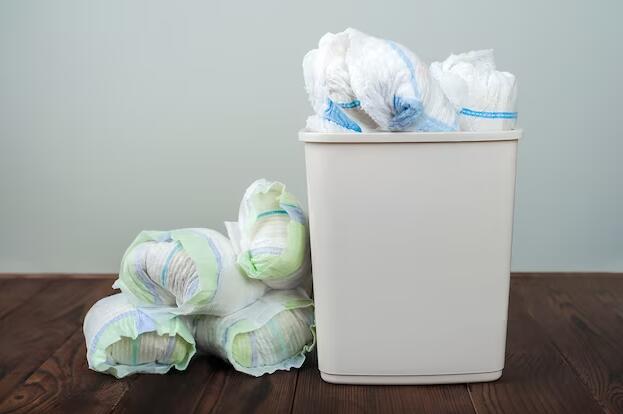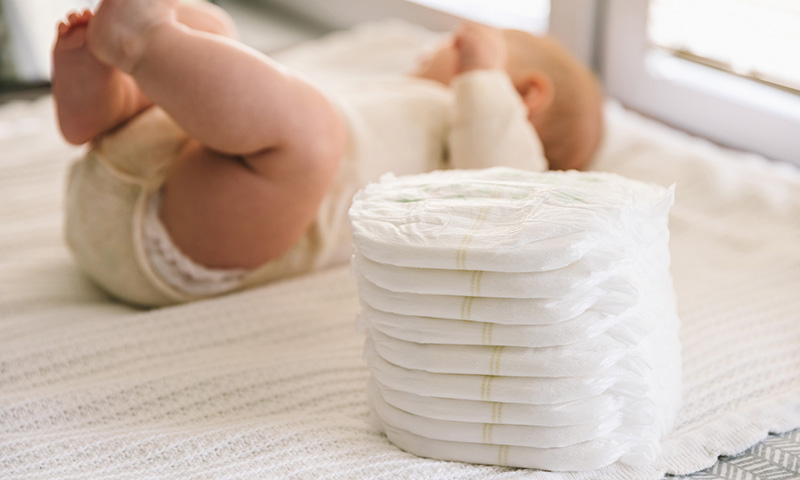If you’re a parent, you’ve probably been faced with the dilemma of cloth versus disposable diapers. While both have their benefits, cloth diapers have become increasingly popular over the last decade or so for their eco-friendliness. However, there is another option for parents who wish to go green but don’t have time or space for laundering cloth: biodegradable diapers! These products are made from natural fibers like cotton and bamboo and use no chemicals in their manufacture. Biodegradable diapers are better than regular disposables because they will break down in an industrial composter or home compost pile—no need to send them through the municipal waste system! Because they require less energy during production, biodegradable products are more efficient than other types of disposable items like paper plates or plastic bags.

Disposable diapers can take hundreds of years to decompose.
Disposable diapers take up to 500-800 years to decompose. That’s a long time! They’re made of plastic, which doesn’t break down in the environment. Plus they contain chemicals that are harmful to the environment and our bodies when we ingest them through wastewater treatment plants or by littering with them on landfills (thereby releasing those chemicals into the air).
Biodegradable products use natural materials that break down quickly in the environment.
Biodegradable products use natural materials that break down quickly in the environment. They’re better for the landfill because they will break down and become part of the soil, rather than sitting there forever like plastic.
Biodegradable diapers are made with natural fibers like cotton or bamboo, which means they can be composted along with other organic materials like vegetable scraps and yard clippings. The process of decomposition helps create healthy soil for new plants to grow!
Biodegradable diapers are better for the landfill because they will break down and become part of the soil.
Biodegradable diapers are better for the landfill because they will break down and become part of the soil. In a landfill, biodegradable diapers will decompose just like any other organic material, but unlike conventional disposables that can take hundreds of years to decompose (and even then only partially), biodegradable diapers will break down within two years. This means that less waste is produced by using these types of products, which is better for both your wallet and our planet!
Biodegradable diapers can be composted.
Composting is a natural process that can be used to turn waste into soil, or fertilizer. It’s a great way to recycle food waste, which would otherwise go into landfills and take up space. Compost can be made at home and used in your garden, or sold as a product for other people to use on their lawns or plants.
Composting involves placing organic materials like leaves, grass clippings, vegetable scraps and manure in layers with soil-like material such as peat moss or wood chips over time until broken down into rich compost suitable for growing plants without chemicals (or very little).
Natural fibers like cotton and bamboo are used in biodegradable diapers, which are more absorbent than other types of cloth diapers
Natural fibers like cotton and bamboo are used in biodegradable diapers, which are more absorbent than other types of cloth diapers. This can be helpful if you have a heavy wetter or if your baby has a lot of poop.
Bamboo is also a natural fiber and it’s quick drying, making it great for hot weather use. It’s also breathable, so your baby will stay cool on those hot days at the park or beach!
Biodegradable diapers are a great alternative to regular disposables for parents who wish to go green with their diapering choices.
Biodegradable diapers are a great alternative to regular disposables for parents who wish to go green with their diapering choices. Biodegradable diapers are made from natural fibers like cotton and bamboo, which means they break down easily in landfills without releasing harmful chemicals into the air or water supply. Biodegradable diapers have been shown to be more absorbent than other cloth alternatives, so you won’t have any leaks or blowouts while using them!
Biodegradable diapers can be composted just like regular organic waste; they don’t require special treatment before being tossed into your backyard compost bin. This makes them an ideal choice if you live in an area where landfills are limited or don’t accept plastic bags full of dirty throws–you won’t have to worry about where these will end up when you’re done with them!
Conclusion
We hope that this article has helped you understand what biodegradable diapers are, why they are beneficial and how they work. If you’re interested in trying them out for yourself or your baby, check out our selection of products below!





